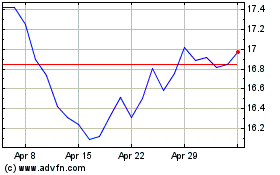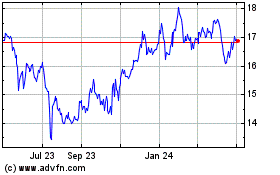Business News: Justices To Mull Future Of Class-Action Cases
September 30 2015 - 8:15PM
Dow Jones News
(FROM THE WALL STREET JOURNAL 10/1/15)
By Jess Bravin
WASHINGTON -- The long-running battle over class-action lawsuits
goes into full swing in the Supreme Court term beginning next week
with cases that could shift the rules for group lawsuits against
businesses.
The court will hear several cases involving a wide range of
disputes, from consumers alleging a pay-television provider
overcharged them to meatpacking workers claiming they were
underpaid. Although the cases typically present questions of legal
procedure rather than broad conceptions of individual rights, the
practical impact of their outcomes could determine whether many
kinds of lawsuits can get into court at all.
Under Chief Justice John Roberts, the court has cast a skeptical
eye toward class-action litigation, nearly always splitting 5-4
along ideological lines when setting rules for how multiparty
litigation is conducted. The dynamic has tended to favor
businesses, which have sought for decades to rein in class-action
cases.
Stephen Burbank, a University of Pennsylvania law professor who
has co-written a book examining private lawsuits on federal rights,
said the split on the mechanics of litigation in part reflects the
legal stakes involved. "Everyone has woken up to the dirty little
secret that procedure is power," Mr. Burbank said.
Corporate defense lawyers say that while the court's
conservative majority has yet to fundamentally tilt the odds
against plaintiffs.
"There's always this hope before the Supreme Court term that we
have these really great issues that are going to be decided, and
there will be a sweeping change in the way class actions work,"
said Paul Karlsgodt, who heads Baker & Hostetler LLP's national
class-action defense practice in Denver. Instead, recent decisions
have included "sweeping statements, but not necessarily a sweeping
holding that had an impact on practice."
On Tuesday, the justices will hear an appeal filed by DirecTV to
dismiss a class-action suit alleging the company improperly charged
California customers for early cancellation of a service
contract.
DirecTV, acquired by AT&T Inc. earlier this year, argues its
customer contract bars individuals from suing the company or
seeking a class remedy for disputes, instead requiring private
arbitration. A state appeals court rejected DirecTV's argument.
On October 14, the court will hear argument on whether an
individual can lead a class of plaintiffs when he was offered full
restitution available under the law to settle.
The case involves a complaint brought by Jose Gomez, a
California man who received unsolicited text messages on Navy
recruitment from Campbell-Ewald, Co., a marketing agency. The
company has unsuccessfully argued its settlement offer to Mr. Gomez
requires the suit to be dismissed.
On Nov. 10, the court hears a case that some experts believe
could produce the term's most significant class-action
decision.
The suit against Tyson Foods Inc. involves whether employees are
entitled to pay for time spent suiting up for work. Employees
claimed they were underpaid for time spent donning and doffing
protective gear and clothing.
Decisions in the cases are expected before July 2016.
Subscribe to WSJ: http://online.wsj.com?mod=djnwires
(END) Dow Jones Newswires
September 30, 2015 20:00 ET (00:00 GMT)
Copyright (c) 2015 Dow Jones & Company, Inc.
AT&T (NYSE:T)
Historical Stock Chart
From Mar 2024 to Apr 2024

AT&T (NYSE:T)
Historical Stock Chart
From Apr 2023 to Apr 2024
